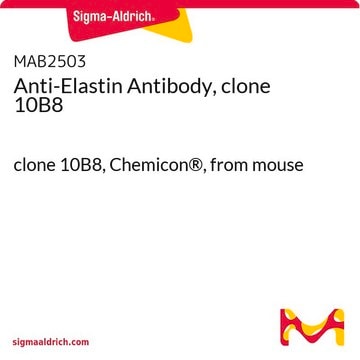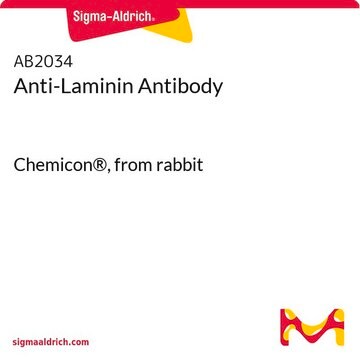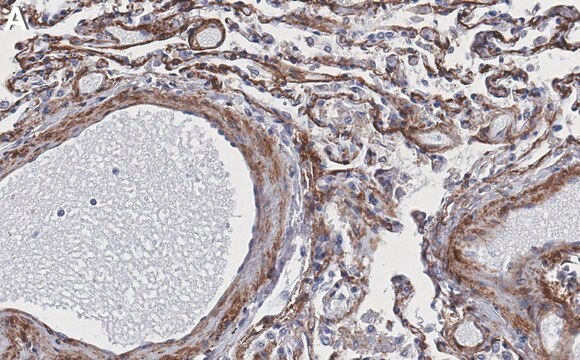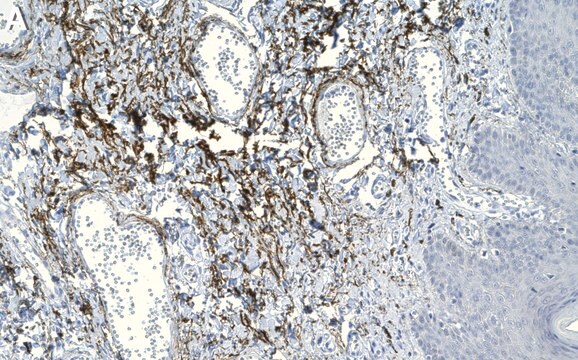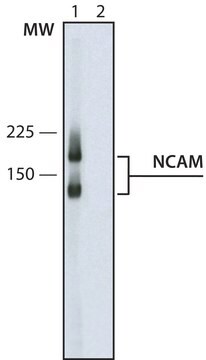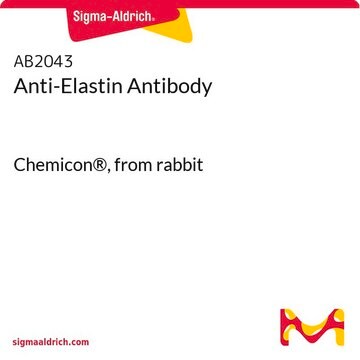すべての画像(1)
About This Item
結合体:
unconjugated
application:
ARR
IHC (p)
IHC (p)
クローン:
BA-4, monoclonal
化学種の反応性:
human, goat, sheep, guinea pig, pig, canine, feline, bovine
citations:
29
テクニック:
immunohistochemistry (formalin-fixed, paraffin-embedded sections): 1:5,000 using sheep arterial tissue
microarray: suitable
microarray: suitable
おすすめの製品
由来生物
mouse
品質水準
結合体
unconjugated
抗体製品の状態
ascites fluid
抗体製品タイプ
primary antibodies
クローン
BA-4, monoclonal
分子量
antigen 67.5 kDa
含みます
15 mM sodium azide
化学種の反応性
human, goat, sheep, guinea pig, pig, canine, feline, bovine
包装
antibody small pack of 25 μL
テクニック
immunohistochemistry (formalin-fixed, paraffin-embedded sections): 1:5,000 using sheep arterial tissue
microarray: suitable
アイソタイプ
IgG1
UniProtアクセッション番号
輸送温度
dry ice
保管温度
−20°C
ターゲットの翻訳後修飾
unmodified
遺伝子情報
human ... ELN(2006)
詳細
Monoclonal Anti-Elastin (mouse IgG1 isotype) is derived from the hybridoma produced by the fusion of mouse myeloma cells and splenocytes from an immunized mouse. Elastin is an important polymeric protein of connective tissue. It is synthesized and secreted as a soluble single-chain protein (tropoelastin) that undergoes numerous post-ribosomal modifications prior to the organization of the elastic fiber in the extracellular space.
特異性
本抗体は不溶性エラスチン、α-エラスチン、トロポエラスチン (エラスチンの非架橋可溶性前駆体) 、不溶性エラスチンのタンパク質分解で生じるペプチドフラグメントに結合します。トロポエラスチ調製物の場合、エラスチンの3つのアイソフォ-ムに対応する3本のバンド (67.5kDa, 65kDa, 62kDa) を検出します。この抗体はエラスチンの繰返し配列から構成されるエピト-プ (Val-Gly-Val-Ala-Pro-Gly) に特異的です。このエピト-プは線維芽細胞および単球に対する化学誘引物質であることが示されています。
免疫原
ウシα-エラスチン
アプリケーション
Monoclonal Anti-Elastin antibody produced in mouse has been used in:
- immunohistochemistry
- immunostaining
- immunoblotting
生物化学的/生理学的作用
Elastin is encoded by the ELN gene in humans. It is a polymeric protein in connective tissue that has exceptional properties of extension, elastic recoil to the extracellular matrix and allows many tissues in the body to resume their shape after stretching or contracting. Elastin is a self-assembling, extracellular-matrix protein providing tissue elasticity and is predominantly comprised of cross-linked tropoelastin. It plays an important role in the atherosclerotic process. The conformational disorder is caused due to a constitutive feature of elastin structure and function.
Elastin undergoes changes of morphology with aging and in many disease states. For example, abnormal accumulation of connective tissue in blood vessels contributes to alterations in vascular physiology associated with diseases such as hypertension and atherosclerosis. Several heritable diseases such as Marfan syndrome, pseudoxanthoma elasticum and the Buschke-Ollendorf syndrome may result from molecular defects of elastin.
免責事項
Unless otherwise stated in our catalog or other company documentation accompanying the product(s), our products are intended for research use only and are not to be used for any other purpose, which includes but is not limited to, unauthorized commercial uses, in vitro diagnostic uses, ex vivo or in vivo therapeutic uses or any type of consumption or application to humans or animals.
適切な製品が見つかりませんか。
製品選択ツール.をお試しください
保管分類コード
10 - Combustible liquids
WGK
WGK 3
引火点(°F)
Not applicable
引火点(℃)
Not applicable
適用法令
試験研究用途を考慮した関連法令を主に挙げております。化学物質以外については、一部の情報のみ提供しています。 製品を安全かつ合法的に使用することは、使用者の義務です。最新情報により修正される場合があります。WEBの反映には時間を要することがあるため、適宜SDSをご参照ください。
Jan Code
E4013-.5ML:
E4013-BULK:
E4013-100UL:
E4013-25UL:
E4013-.2ML:
E4013-VAR:
この製品を見ている人はこちらもチェック
Exercise training enhances elastin, fibrillin and nitric oxide in the aorta wall of spontaneously hypertensive rats
de Andrade AMTJ, et al.
Experimental and Molecular Pathology, 89(3), 351-357 (2010)
Sean E Reichheld et al.
The Journal of biological chemistry, 289(14), 10057-10068 (2014-02-20)
Elastin is the intrinsically disordered polymeric protein imparting the exceptional properties of extension and elastic recoil to the extracellular matrix of most vertebrates. The monomeric precursor of elastin, tropoelastin, as well as polypeptides containing smaller subsets of the tropoelastin sequence
Chae-Eun Yang et al.
International journal of molecular sciences, 21(6) (2020-03-28)
An adenoviral vector (Ad) expressing a Wnt decoy receptor (sLRP6E1E2) is known to induce an anti-fibrotic effect by inhibiting Wnt signaling. We evaluated its effects in vivo using pig models and attempted to introduce an alginate gel-matrix system to prolong
Fabricated elastin
Yeo GC, et al.
Advanced Helathcare Materials, 4(16), 2530-2530 (2015)
Moetaz El-Domyati et al.
Journal of cosmetic dermatology, 14(2), 140-144 (2015-04-29)
Botulinum toxin (BTX)-A has been used for years in the reduction of facial wrinkles; however, histological and immunohistochemical changes after its use were not previously investigated. To evaluate histological and immunohistochemical changes after BTX-A injection for facial wrinkles, sixteen volunteers
ライフサイエンス、有機合成、材料科学、クロマトグラフィー、分析など、あらゆる分野の研究に経験のあるメンバーがおります。.
製品に関するお問い合わせはこちら(テクニカルサービス)